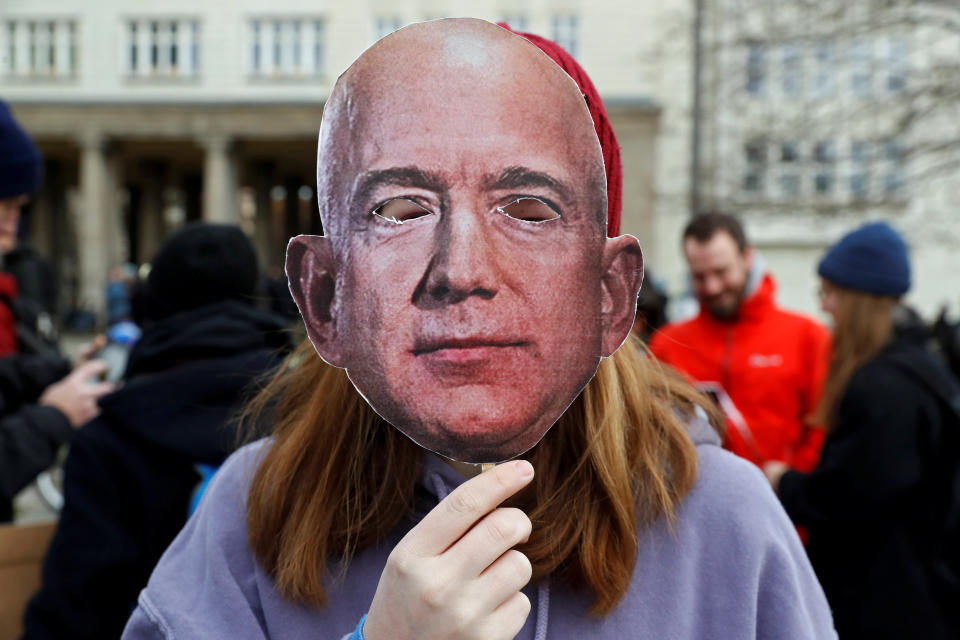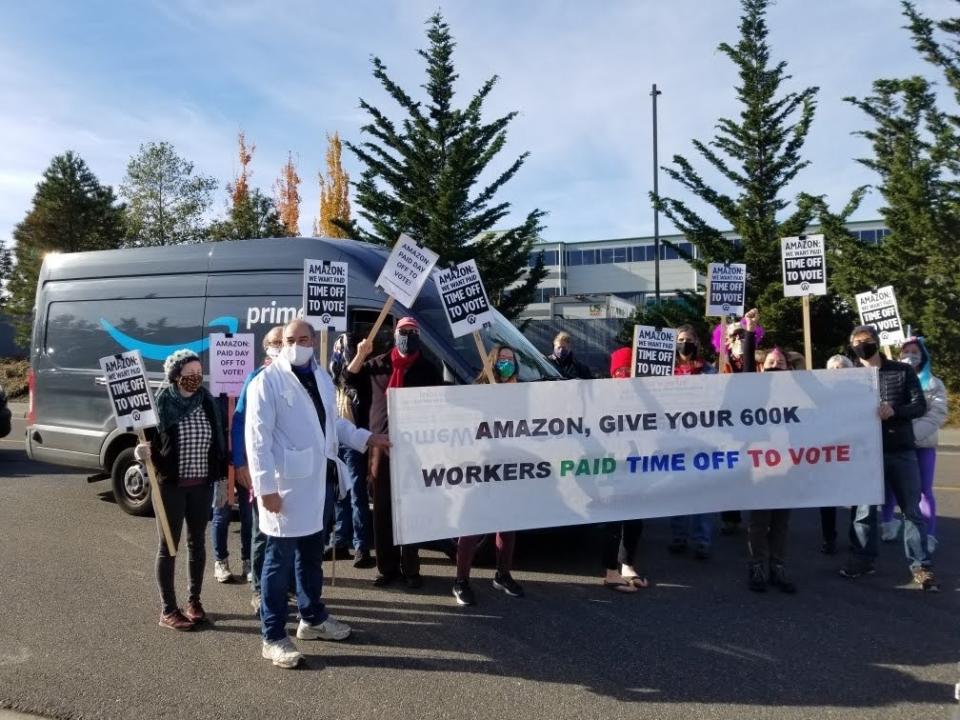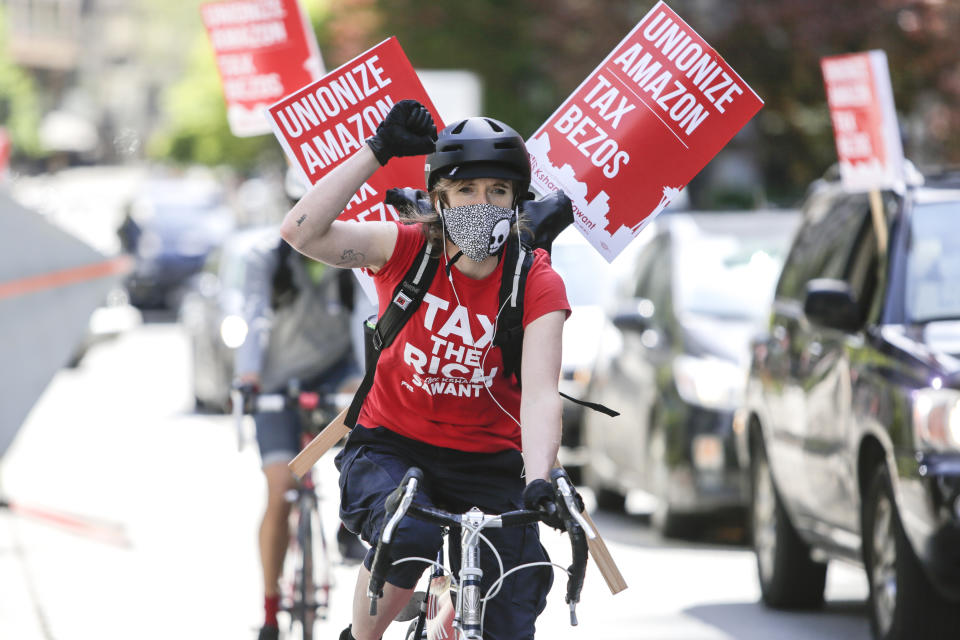'We're not backing down': Amazon workers want paid time off to vote in 2020 elections
Amazon (AMZN) critics held protests outside of nine warehouses nationwide on Saturday demanding paid time off to vote for all of the company’s 800,000 U.S.-based employees, blocking warehouse truck entrances at multiple locations for up to an hour and a half, said advocacy group Amazon Employees for Climate Justice (AECJ).
The protests on Halloween involved hundreds of activists and community members, escalating a weeks-long campaign that featured a petition last month signed by 6,500 workers, the group said. The demonstrations spanned sites from Washington and California to New Jersey and Connecticut.
Advocates say Amazon has fallen behind a slew of major corporations that announced plans earlier this year to provide their employees with paid time off to vote, including Walmart (WMT), Apple (AAPL), and Coca-Cola (KO). Critics of Amazon say workers should not suffer a financial penalty for voting, especially at a tech giant like Amazon, the nation’s second-largest employer.
Chris Smalls, an Amazon warehouse worker who was fired the same day he participated in a walkout earlier this year over workplace safety, said the company is “once again putting profits above a basic right.” (Amazon says it terminated him for violating social distancing guidelines.)

“It should be a nationwide policy allowing workers to utilize their right to vote in one of the most important elections of American modern history,” Smalls says.
Amazon rejects the notion that it obstructs workers from voting, saying that its workers can draw from their standard allotment of paid or unpaid time off if they lack time to vote outside of work hours. Plus, the company provides employees with extra paid time off to vote when required by state or local law, it said.
The company also contested AECJ’s description of the protests on Saturday. Activists held seven demonstrations that involved less than 100 people, Amazon said.
‘It’s only right that we get paid to vote’
Derrick Palmer, who works at an Amazon warehouse in Staten Island, NY., received paid time off to vote because New York mandates companies provide it. But he said said all of his colleagues should get the same opportunity. He supports the recent protests as “a step in the right direction.”
“It’s only right that we get paid to vote, knowing that we’re devoting so much of our time and energy to get packages out to customers,” he says. “We’re not backing down.”
The clash over voting access days before a polarizing presidential election on Nov. 3 marks the latest in a series of demonstrations over working conditions at the tech giant’s vast warehouse network as a global pandemic has boosted Amazon’s e-commerce business but also heightened the safety risks faced by its employees.
The protests on Saturday came two days after Amazon announced strong third quarter earnings that included a 37% increase in sales year-over-year.
“Amazon places a higher value on one day’s profit from warehouses than on voter justice for its own workers,” AECJ said in a statement. “Workers who are living paycheck to paycheck, and must make the decision between standing in line at the polls and showing up for work.”

In a statement to Yahoo Finance, Amazon strongly rebutted claims that it has made it difficult for employees to vote. "We are encouraging our employees to vote. We have provided all of our employees information on how to register to vote, details of their local polling locations and how to request that time off to vote if needed,” the statement said. The company said the protests on Saturday did not affect its business operations.
Most states require companies to provide time off for their workers to vote, but only some states mandate that businesses compensate workers while they’re off the job.
As of August, more than 700 companies had joined a a non-partisan organization called Time to Vote, which since 2018 has asked companies to provide time off to vote for their employees. Meanwhile, over 875 companies have signed a commitment to guarantee paid time off to employees for voting, including Lyft (LYFT) and Shake Shack (SHAK).
“There’s a growing number of companies that have provided employees with time off to vote,” says Michael Martinez, a political science professor at the University of Florida. “Companies sometimes sponsor scout troops or softball leagues, but a growing number of companies, this year especially, are looking at participation in elections.”
Amazon lags behind, Martinez added.
“They’re not keeping up with some other companies that are moving in the direction of being more civically active,” he says.

Jonathan Entin, a professor emeritus of law at Case Western Reserve University, said companies like Amazon weigh the potential costs of such a policy against the public relations boost it might generate.
“A company thinks about how much will it cost them in terms of money and disruption of normal operations on one side,” he says. “On the other side, it’s how much benefit do they get in terms of being thought of as a civic minded and generous business.”
Speaking to Yahoo Finance on Monday, the day before the election, Martinez said the protests were unlikely to change the company’s policy toward this year’s vote.
“Obviously, I don’ think it’ll have an effect tomorrow,” he says. ”It may down the road.”
Correction: A prior version of this article incorrectly stated Amazon has 600,000 U.S.-based employees. It has 800,000.
Read more:
'It's life and death': Amazon Prime Day protests are being held across US
Top unions call for closure of all Amazon warehouses — experts say it would be disastrous
'We're risking our lives': Why Amazon warehouse workers are walking out over coronavirus fears
Read the latest financial and business news from Yahoo Finance


